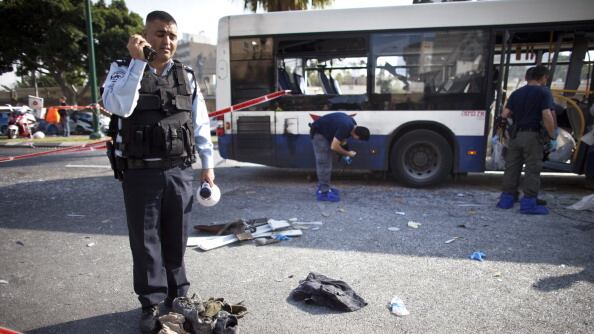Today, an explosion rocked a Tel Aviv bus, injuring more than 20 people. Harkening to the last Intifada's suicide bombings, the attack will surely raise the worries of residents of this costal city, known as "the bubble" for its isolation from the conflict, that violence had again arrived at their doorsteps. But last weekend—even after rockets landed in the area—told a different story.

On Friday night, a casually dressed couple in their forties, held the hands of their two hungry children as they waited for their friends near the Love Eat coffee shop at the hip Jaffa Port. They drove from their home in Kadima, a community about 50 minutes north of Tel Aviv. Neither of them was concerned about going out in the Tel Aviv area that night—even though a Fajr-5 missile had fallen nearby that afternoon, and the night before.
“By the looks of it, most people didn't think like we did,” said Diego Kabiliyo, sounding somewhat concerned, as he surveyed the numerous empty tables at the usually packed restaurants up and down the port. The Kabiliyos didn't feel they were in any real danger. “The chance of one falling on us was about the same as the likelihood that I'd win the lottery tomorrow,” said his wife, Taly.
Though they agreed on their soirée in the Fajr-5 range, the Kabiliyos didn't see eye-to-eye on the Israeli military campaign in Gaza. Diego supported it, while Taly said: “It's problematic for me to see this operation as good when it's violent."
Few Israeli Jews hold Taly's view, but those that do seem to be all living in Tel-Aviv. Here, people made protests against Operation Pillar of Cloud. And, when Fajr-5s began making them run for cover they did not began shouting to "flatten all of Gaza." People here in "the bubble" are more open-minded than most Israelis elsewhere.
Four employees chatted at the outdoor bar of Container, a casual but upscale bar serving expensive non-kosher seafood and lots of alcohol. They were the only ones there. So do you support the military operation against Gaza? I asked. Do you want to kill them all? They looked at me, bewildered. “You're in the wrong city,” said Avner Araji, 28, looking at me somewhat aghast. “We don't think that way here.” Shachar Orr, the curly-haired bartender explained why he didn't want war: “We've been in war for so long and it doesn't lead to anything. Look, it's a problem that missiles fall here and on the south. But there is a conflict that is causing them to shoot rockets."
Then three Russian-speakers sat down at the bar. Twenty-year-old Dima, who arrived three years ago from Lativa, told me he supported the operation.
“This is a war,” he said. “There were Arabs here. Then Jews came. It wasn't fun for the Arabs. They made it bad for the Jews. The Jews responded.” He summed it up: “There are good people and there are bad people.”
“That's what you think?” interjected the shocked barman. “That the Israeli-Arab conflict can be divided between good and bad people?” As I left the tables began to fill up. Maybe Tel Avivis decided this weekend that it was safe after all. With today's bus attack, though, that's likely to change very quickly.




